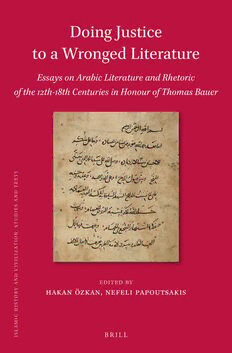
Doing Justice to a Wronged Literature: Essays on Arabic Literature and Rhetoric of the 12th-18th Centuries in Honour of Thomas Bauer PDF
Preview Doing Justice to a Wronged Literature: Essays on Arabic Literature and Rhetoric of the 12th-18th Centuries in Honour of Thomas Bauer
DoingJusticetoaWrongedLiterature Islamic History and Civilization studies and texts EditorialBoard HinrichBiesterfeldt SebastianGünther HonoraryEditor WadadKadi volume 194 Thetitlespublishedinthisseriesarelistedatbrill.com/ihc PortraitofThomasBauer photo by natalie kraneiss Doing Justice to a Wronged Literature Essays on Arabic Literature and Rhetoric of the 12th–18th Centuries in Honour of Thomas Bauer Editedby HakanÖzkan NefeliPapoutsakis leiden | boston Coverillustration:Fol.1bofIbnNubāta’sautographofMuntaḫabal-hadiyya,msKöprülü1379. CourtesyoftheSüleymaniyeLibrary,Istanbul,Turkey. TheLibraryofCongressCataloging-in-PublicationDataisavailableonlineathttps://catalog.loc.gov lcrecordavailableathttps://lccn.loc.gov/2022031939 TypefacefortheLatin,Greek,andCyrillicscripts:“Brill”.Seeanddownload:brill.com/brill‑typeface. issn0929-2403 isbn978-90-04-52177-3(hardback) isbn978-90-04-52178-0(e-book) Copyright2022byHakanÖzkanandNefeliPapoutsakis.PublishedbyKoninklijkeBrillnv,Leiden, TheNetherlands. KoninklijkeBrillnvincorporatestheimprintsBrill,BrillNijhoff,BrillHotei,BrillSchöningh,BrillFink, Brillmentis,Vandenhoeck&Ruprecht,BöhlauandV&Runipress. KoninklijkeBrillnvreservestherighttoprotectthispublicationagainstunauthorizeduse.Requestsfor re-useand/ortranslationsmustbeaddressedtoKoninklijkeBrillnvviabrill.comorcopyright.com. Thisbookisprintedonacid-freepaperandproducedinasustainablemanner. Contents Editors’Introduction ix TabulaGratulatoria xix PublicationsofThomasBauer xx 1 Usāmab.Munqiḏ(488–584/1095–1188)undderǧihād 1 EwaldWagner 2 TheRhetoricalFabricofaSeventh/Thirteenth-CenturySufiPoem byʿAfīfal-Dīnal-Tilimsānī 10 AliAhmadHussein 3 “Youhavebecometheamīrofmyheart”:AnEditionoftheFaṣāḥat al-mashūqfīmalāḥatal-maʿshūqortheMaqāmaIqṭāʿiyyaofal-Shābb al-Ẓarīfal-Tilimsānī(d.688/1289) 36 BilalOrfaliandMauricePomerantz 4 DieKunstderzaǧal-DichtungvonIbnMuqātilamBeispiel seinesqalbīyuḥibbtayyāh 50 HakanÖzkan 5 OffiziellemamlukenzeitlicheSchreibenundihreAussagekraft amBeispieleinerFrohbotschaftausderFederIbnNubātas 71 AndreasHerdt 6 EinHetärengesprächausdemKairodes8./14.Jahrhunderts:al-Miʿmār: Dīwān,GedichtNr.540 90 GregorSchoeler 7 MediainFlux:TheTaleoftheYellowFoliofromKalīlaandDimna 119 BeatriceGruendler 8 Al-Ibdāʿ,aTourdeForceofRhetoric:TheHistoryofanArabic RhetoricalTerm 148 GeertJanvanGelder viii contents 9 DasNilhochwasservon761/1360undIbnAbīḤaǧalasas-Saǧʿal-ǧalīl fī-māǧarāminan-Nīl 169 WernerDiem 10 HiddenLiteraryHistory—IsmaʿiliTraditioninSyria 190 VerenaKlemm 11 „BetrübteWeisenimWaldrevier“—DieTaubeinAnthologien derMamlukenzeit 211 AnkeOsigus 12 TheMagicofBooks:TheNarrativeFunctionofBooksinArabicPopular Epic 247 RemkeKruk 13 KontrastundEntsprechung—IbnḤiǧǧaal-ḤamawīsUmgangmitder rhetorischenStandardtheorieausdem8./14.Jahrhundertinseinem KommentarzuseinemStilmittelgedichtausdem9./15. Jahrhundert 269 SyrinxvonHees 14 ʿAbdar-Raḥīmal-Buraʿī:EineSpurensuche 287 InesWeinrich 15 OrpheuszwischenKāfundNūn:EinAusflugindiearabische Unterwelt 316 ClaudiaOtt 16 PoetischwiderWillen:DerKoranimVersMāmayhs—Überpoetische VerfahrenderDoppel-bzw.Mehrfachcodierungund desCode-Switchinginiqtibās-Epigrammen 334 AlevMasarwa 17 IbrāhīmIbnal-Mullā’s(d.1032/1623)Ḥalbatal-mufāḍalawa-ḥilyat al-munāḍala:ThecorrespondenceofanOttoman-EraAleppine Littérateur 366 NefeliPapoutsakis IndexofArabicTerms 387 IndexofNames 390 Editors’ Introduction In 2013,Thomas Bauer was awarded the prestigious German Leibniz Award, withwhichhefoundedandfundedalea(abbreviationforArabischeLitera- turundRhetorikElfhundertbisAchtzehnhundert),aresearchgroupbasedat the Department of Arabic and Islamic Studies of the University of Münster, with a view to promoting the study of Arabic literature and rhetoric dating fromthesixth/twelfthtothetwelfth/eighteenthcenturies—anareaofArabic studies notoriously neglected and maligned by earlier scholarship. The idea of producing a Festschrift for Thomas’s sixtieth birthday in September 2021, originated in this group. With it, we wished to express our gratitude to him aswellascelebratehislongandoutstandingcareerasaresearcheranduni- versity teacher that has established him as a leading academic in our field. Thomas’slatestgreatsuccessgaveusadditionalreasontocelebrateandhon- our him: In December 2019, in collaboration with Syrinx von Hees, Thomas Bauerwonatwelve-yearresearchgrantfromthedfg(DeutscheForschungs- gemeinschaft)toproduceanopen-access,onlinecriticaleditionof thecom- pleteworksof IbnNubātaal-Miṣrī(686–768/1287–1366),themostacclaimed ArabpoetoftheMamlukera.Thisprojectemploysfiveseniorresearchers,two doctoral students and a Digital Humanities expert. It thus secured the posi- tions of all members of the alea group for at least twelve years (four of us obtainedtenure),whichshowsThomas’scareforthestaff of theDepartment heruns. Thomas Bauer is not only an Arabist but also an Islamicist and has pro- ducedseveralground-breakingstudiesinanumberofdifferentareas,including classicalArabiclexicography,earlyArabicpoetry,Abbasidliterature,Arabiclit- erature and rhetoric of the Ayyubid, Mamluk and Ottoman periods, and the culturalhistoryofIslammoregenerally.Itisfairtosaythathisworkhasbrought the field forward in all these areas by offering a fresh and imaginative thor- oughreadingofthesourcesthatchallengeswell-establishedviewsandopens upnewperspectivesforfutureresearch.Thankstoaseriesof criticalstudies producedoverthelasttwodecadesinparticular,hehassucceededindebunk- ingthedeclinenarrativebycallingattentiontothequality,interestandvitality oftheArabicliteraturedatingfromthesixth/twelfthtothetwelfth/eighteenth centuriesandtoitscomplexanddiverseaesthetics.Apartfromfoundingthe aleagrouptoboostresearchinthisundeservedlyneglectedarea,healsosup- portedandinspiredothercolleagues,too,toworkonthisdomain.Thisiswhy we decided to give the Festschrift the thematic focus “Arabic literature and rhetoricfromthesixth/twelfthtothetwelfth/eighteenthcenturies,”although x editors’ introduction this by no means covers the wide range of topics, on which Thomas Bauer has worked.Thirty-odd years ago, when ʿUmar Mūsā Bāshā, an Arab scholar muchadmiredbyThomasandapioneerinthestudyof thisarea,described Ottoman-eraArabicliteratureasal-adabal-maẓlūm(thewrongedliterature),1 thischaracterisationheldtruefortheliteratureof theAyyubidandMamluk periodsaswell.MeanwhileThomasBauer’sworkhasdonemuchtorehabilit- atethisliteratureanddojusticetoit. The present volume is a collection of case studies on individual literary authors, texts, themes and rhetorical figures dating from the said period. A numberofscholarswhoeitherhaveworkedcloselywiththealeagroupsince itsfoundationorarelong-timefriendsofThomashavejoinedusinproducing it. Due to pandemic-related restrictions and inconveniences, however, some colleagueswhohadinitiallyagreedtocontributetotheFestschrifthaveregret- tablybeenobligedtowithdraw.EmilT.Homerin,adearfriendof thealeas, who had very much wanted to participate, sadly passed away in December 2020. Others were willing to contribute but felt that the volume’s thematic focus lay beyond their area of expertise and thus could not participate. We wouldliketothankthemallfortheirreadinesstojoinusinhonouringThomas andthankespeciallyallcontributorsfortheirkindcooperation.Wealsocordi- allythankHinrichBiesterfeldandSebastianGüntherforacceptingthevolume for publication in the Islamic History and Civilization series of Brill and are grateful to Teddi Dols for her assistance throughout the process of produc- tion. Thecontributionsareprecededbyashortacademiccurriculumvitaeand a list of publications of Thomas Bauer and have been arranged very roughly chronologically, but the adab principle of delectable variation has also been observed—allthemoresoasseveralarticlestakeadiachronicperspectiveand coverseveralcenturies. The work of Usāma Ibn Munqidh (488–584/1095–1188), a sixth-/twelfth- centuryArabintellectualandpoliticianwhoisprimarilyknownforhismem- oirs, the Kitāb al-Iʿtibār (Book of instruction by example), has long attrac- ted attention for the insights it offers into contemporary Muslim attitudes towardstheCrusaders.InthisconnectionEwaldWagnerrevisitsatopicthat hasforsometimebeendebatedbetweenPaulCobbandRobertIrwin,namely, Usāma’sattitudetowards jihad.AdducingnewevidencefromUsāma’spoetry, a source untapped by the two scholars, he shows that Usāma was not unfa- vourablydisposedtowards jihad,asIrwinhadclaimed,thussupportingCobb’s 1 ʿUmarMūsāBāshā,Taʾrīkhal-adabal-ʿarabī:al-ʿAṣral-ʿUthmānī,Damascus1989,7.
